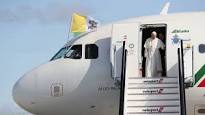Pope visits an Ireland where church is no longer centre stage
Pope Francis, the 266th and current Pope, is on a visit to Ireland. It is a visit that is markedly different than when Pope John Paul II came to Ireland in 1979, nearly forty years ago, when the church still held centre stage in Irish society. The visit of Pope Francis has been dominated by criticism of the Catholic Church's failure to adequately address sex abuse crimes by clergy. Former President of Ireland, Mary McAleese, had accused Pope Francis of being in a mode of thinking that puts the defence of the Catholic Church as an institution ahead of the interests of victims of clerical child sexual abuse. In doing so she pointed to Pope Francis attack on victims of child abuse when on a visit to Chile in January of this year. On that visit he accused victims of a paedophile priest of slander, something he subsequently apologised for. However, Former President McAleese stated her belief that the covering-up of abuse by bishops was not only systemic, but that it was directed from what she called "central command and control, which is the Vatican".
Ireland is no longer a country that is dominated by the Catholic Church and it is Catholics themselves who have been at the forefront of demanding a clear separation of church and state. The full horrors of religious dominance in Irish society are being uncovered on a daily basis. Heart rending accounts are being told of the victims of the Magdalene Laundries, mother-and-baby homes, industrial schools, illegal adoptions and clerical child abuse. The present Irish Taoiseach (Prime Minister) Leo Varadkar said the failures of the Church, the state and wider society had created a "bitter and broken heritage for so many, leaving a legacy of pain and suffering." The Taoiseach also made statement that: "I think in the past the Catholic Church had too much of a dominant place in our society.
"I think it still has a place in our society but not one that determines public policy or determines our laws."
So the present Pope is visiting a much different Ireland that his predecessor, Pope John Paul II did forty years ago. It is a change for the better. The lesson of Ireland is equally applicable to other nations where the state is dominated by religion. It is a dangerous thing when religious fanaticism of all sorts, not least the Abrahamic religions of Islam, Judaism and Christianity, take centre stage in determining the public policy and law of a nation. Religion should be a matter of personal belief and certainly the church should be separated from the nation state.






